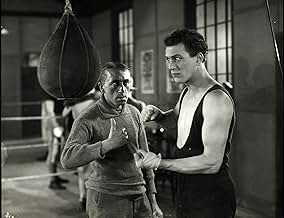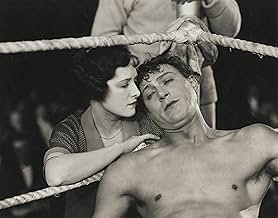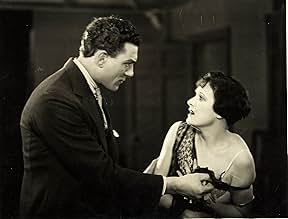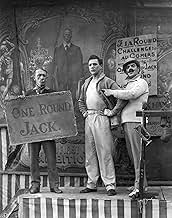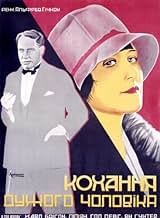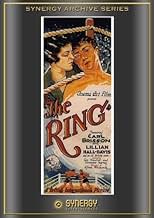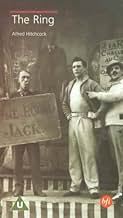NOTE IMDb
6,1/10
4,2 k
MA NOTE
Deux boxeurs rivalisent pour l'amour d'une femme.Deux boxeurs rivalisent pour l'amour d'une femme.Deux boxeurs rivalisent pour l'amour d'une femme.
- Réalisation
- Scénario
- Casting principal
Lillian Hall-Davis
- The Girl
- (as Lilian Hall Davis)
Eugene Corri
- Eugene Corri
- (non crédité)
Charles Farrell
- Second
- (non crédité)
Clare Greet
- Fortune Teller
- (non crédité)
Lawrence Hanray
- Clerrgyman in Black Cassock
- (non crédité)
Tom Helmore
- Spectator
- (non crédité)
Alfred Hitchcock
- Man-Dipping Attraction Worker
- (non crédité)
Minnie Rayner
- Boxing Contestant's Wife
- (non crédité)
Brandy Walker
- Spectator
- (non crédité)
Bombardier Billy Wells
- Boxer
- (non crédité)
Avis à la une
Hitchcock displays his already developed understanding for visuals in this early silent film. The plot of the film, involving two boxers fighting over a girl, is straight-forward drama without much to recommend it. Hitchcock's talent, though, is found in his stunning use of images. Nearly every shot is filled with visual symbols. Especially memorable is the jewelry that one boxer gives the girl just before she marries the other boxer. He slides it up her arm in a clearly sexual way and with one simple movement Hitch has shown us all we need to know. The boxing scenes are handled well with some interesting point-of-view shots that again prove how far ahead of his time Hitchcock was. The film also gives insight into his later treatment of women. The object of the boxers' desires is driven by money and lust, not reason or love. The only other women in the film are either beautiful party girls who make open offers of sex or old crones who help to destroy happy relationships. All in all, the Ring is a must for anyone interested in Hitchcock's early work and his development as a visual storyteller.
Alfred Hitchcock's only screen writing credit follows the story of two aspiring boxers as they slowly work their way to the top of their game. 'One-Round' Jack (Carl Brisson) works in a carnival show, using the gimmick of being able to knock any challengers out in one round to draw the crowds. When onlooker Bob Corby is reluctantly talked into going a round with Jack, he knocks him out, much to Jack's dismay and surprise. Caught between the two fighters is Jack's girlfriend Mabel (Lilian Hall Davis) who takes a liking to Bob, especially as he begins his rise up the boxing ranks. As Jack's frustration and jealousy grows, so does his success. As the two fight their way to the top, the likelihood of a climatic bout between the two protagonists increases with every fight. Ultimately it becomes a mental and physical battle for the love of Mabel.
The meaning of the title is multi-layered - of course referring the boxing ring, but also the arm bracelet that Mabel receives from Bob that comes to represent the everlasting loop that the three lead characters are caught up in. Although relatively little-seen compared to some of the popular boxing movies, Hitchcock's silent has undoubtedly had a great impact of the sport genre, especially on Scorsese's Raging Bull. Hitchcock was fascinated with boxing - the idea of a physical and mental duel between two gladiators, and also with the dirty feel of the arena. Halls would be filled by both smartly-dressed socialites, and the working-class looking for a bit of escapism. The place would be filled with cigarette smoke, sweat and dirt trampled in by the masses. Although this doesn't quite have the cinematic flair of Scorsese's masterpiece, the photography is clearly comparable, and is extremely impressive given its era. This is Hitchcock's early experiment, where he would develop techniques he would come to perfect in his long-list of truly great films. A fascinating film from the man that would become one of the giants of cinema.
www.the-wrath-of-blog.blogspot.com
The meaning of the title is multi-layered - of course referring the boxing ring, but also the arm bracelet that Mabel receives from Bob that comes to represent the everlasting loop that the three lead characters are caught up in. Although relatively little-seen compared to some of the popular boxing movies, Hitchcock's silent has undoubtedly had a great impact of the sport genre, especially on Scorsese's Raging Bull. Hitchcock was fascinated with boxing - the idea of a physical and mental duel between two gladiators, and also with the dirty feel of the arena. Halls would be filled by both smartly-dressed socialites, and the working-class looking for a bit of escapism. The place would be filled with cigarette smoke, sweat and dirt trampled in by the masses. Although this doesn't quite have the cinematic flair of Scorsese's masterpiece, the photography is clearly comparable, and is extremely impressive given its era. This is Hitchcock's early experiment, where he would develop techniques he would come to perfect in his long-list of truly great films. A fascinating film from the man that would become one of the giants of cinema.
www.the-wrath-of-blog.blogspot.com
It's basically just a love-triangle story, but Hitchcock's storytelling skills and mastery of silent film techniques make "The Ring" well worth watching. There is a lot of visual detail and symbolism that add meaning to a basically routine story about small-time boxer Jack, his girl, and the champion who gives Jack his big break but who also tries to steal his girl.
The opening sequence establishes the triangle amidst the colorful atmosphere of a traveling show, where Jack takes on all comers inside a tent. It is filled with a lot of detail, especially the bracelet that Bob, the champion, gives to Jack's girl, which is important as a plot element and as a symbol. (This "ring" is one of several meanings of the film's nicely-chosen title.) Most of the plot that follows is predictable, as it is clear from the beginning that someday Bob and Jack will have to square off in the ring with more than Bob's title at stake. But if the story is routine, Hitchcock's technique is not. There are a lot of creative touches that develop the characters and story, and that add humor and interest. The cast is pretty good, and some of the secondary characters from the traveling show are very funny in the earlier scenes.
This is certainly an old-fashioned movie, and won't be of general interest today, but it's a nice little film. Anyone who likes silent films or who wants to see something quite different from the "Master of Suspense" should find this worth a look.
The opening sequence establishes the triangle amidst the colorful atmosphere of a traveling show, where Jack takes on all comers inside a tent. It is filled with a lot of detail, especially the bracelet that Bob, the champion, gives to Jack's girl, which is important as a plot element and as a symbol. (This "ring" is one of several meanings of the film's nicely-chosen title.) Most of the plot that follows is predictable, as it is clear from the beginning that someday Bob and Jack will have to square off in the ring with more than Bob's title at stake. But if the story is routine, Hitchcock's technique is not. There are a lot of creative touches that develop the characters and story, and that add humor and interest. The cast is pretty good, and some of the secondary characters from the traveling show are very funny in the earlier scenes.
This is certainly an old-fashioned movie, and won't be of general interest today, but it's a nice little film. Anyone who likes silent films or who wants to see something quite different from the "Master of Suspense" should find this worth a look.
"The Ring" is a surprisingly torpid little film which I thought was not one of The Master's better efforts. Yes, yes, I know, there were some of his signature cinematic compositions and visual touches, but the play's the thing, right? This was pretty ordinary subject matter for someone with Hitch's reputation - love triangle, jealousy, revenge, etc. There were no surprises, no maguffins, no suspense, just plodding drama.
Maybe the best part of this film is the casting. I enjoyed watching Carl Brisson very much as the cuckolded husband, "One-Round Jack" and the always affable Ian Hunter - even when playing a cad, although he is slightly paunchy for a heavyweight champ. Hitch also got a lot of mileage from the entertaining Gordon Harker as Jack's second.
But I disagree with some reviewers that this was one of Hitchcock's better silents. "The Manxman" is a far superior film, and also stars Brisson as a cuckolded husband. That was a story you could get your teeth into; not so with "The Ring", which was pure pablum.
Maybe the best part of this film is the casting. I enjoyed watching Carl Brisson very much as the cuckolded husband, "One-Round Jack" and the always affable Ian Hunter - even when playing a cad, although he is slightly paunchy for a heavyweight champ. Hitch also got a lot of mileage from the entertaining Gordon Harker as Jack's second.
But I disagree with some reviewers that this was one of Hitchcock's better silents. "The Manxman" is a far superior film, and also stars Brisson as a cuckolded husband. That was a story you could get your teeth into; not so with "The Ring", which was pure pablum.
The Ring was made from the only screenplay Hitchcock wrote himself and it deals, as many of his earliest pictures do, with a love triangle. At first glance, it looks like a more cynical update of the infidelity-themed morality comedies of Cecil B. De Mille, but more than that it is the first really competent Hitchcock picture. Even if he was not yet using the ideas and motifs of suspenseful thrillers, he was at least developing the tools with which to create suspense.
As well as being a student of the German Expressionist style, the rhythmic editing style of Sergei Eisenstein had had its impact upon Hitchcock. But here he keeps tempo not just with the edits but with the content of the imagery. This is apparent from the opening shots, where spinning fairground rides brilliantly establish a smooth tempo. And like Eisenstein, the editing style seems to suggest sound for example when a split-second shot of the bell being rung is flashed in, we almost subconsciously hear the sound because the image is so jarring.
There is also a contrast, particularly with silent films from the US, in that The Ring is not cluttered up with too many title cards. As much as possible is conveyed by imagery, and Hitch has enough faith in the audience to either lip-read or at least infer the meaning of the bulk of the characters' speech. And it's not done by contrived symbolism or overacting, it's all done by getting the right angles and the right timing, particularly with point-of-view shots, as well as some strong yet subtle performances. There are unfortunately a few too many obvious expressionist devices (particularly double exposures), many of which were unnecessary, but there is far less of this than there is in The Lodger.
Let's make a few honourable mentions for the aforementioned actors. First up, the stunningly handsome and very talented Carl Brisson in the lead role. In spite of his talent I was at first a bit confused as to why he got the role, as to be honest he looks more like a ballet dancer than a pugilist! But that just goes to show how much I know, as it turns out Brisson was in fact a former professional boxer and inexperienced in acting. Playing his rival is the competent Ian Hunter, who would go on to have a lengthy career in supporting roles right up to the 60s. The most demanding role in The Ring has to be that given to Lillian Hall-Davis, torn between two lovers. She pulls it off very well however with an emotive, understated performance, and it's a shame her career never lasted in the sound era. And last but not least the great Gordon Harker provides some comic relief in what is probably his best ever role.
The Ring's climactic fight scene is among the most impressive moments of silent-era Hitchcock. Martin Scorcese may have had his eye on The Ring when he directed the fight scenes in Raging Bull, as his watchword for these scenes was "Stay inside the ring". The fight in The Ring starts off with some fairly regular long shots, but when the action intensifies Hitchcock drops us right in the middle of it, with close-ups and point-of-view shots. Hitchcock's aim always seems to have been to involve his audience, and this was crucial in his later career where the secret of his success was often in immersing the viewer in the character's fear or paranoia.
The Ring really deserves more recognition than the inferior but better known The Lodger. It's a much more polished and professional work than the earlier picture, and probably the best of all his silent features.
As well as being a student of the German Expressionist style, the rhythmic editing style of Sergei Eisenstein had had its impact upon Hitchcock. But here he keeps tempo not just with the edits but with the content of the imagery. This is apparent from the opening shots, where spinning fairground rides brilliantly establish a smooth tempo. And like Eisenstein, the editing style seems to suggest sound for example when a split-second shot of the bell being rung is flashed in, we almost subconsciously hear the sound because the image is so jarring.
There is also a contrast, particularly with silent films from the US, in that The Ring is not cluttered up with too many title cards. As much as possible is conveyed by imagery, and Hitch has enough faith in the audience to either lip-read or at least infer the meaning of the bulk of the characters' speech. And it's not done by contrived symbolism or overacting, it's all done by getting the right angles and the right timing, particularly with point-of-view shots, as well as some strong yet subtle performances. There are unfortunately a few too many obvious expressionist devices (particularly double exposures), many of which were unnecessary, but there is far less of this than there is in The Lodger.
Let's make a few honourable mentions for the aforementioned actors. First up, the stunningly handsome and very talented Carl Brisson in the lead role. In spite of his talent I was at first a bit confused as to why he got the role, as to be honest he looks more like a ballet dancer than a pugilist! But that just goes to show how much I know, as it turns out Brisson was in fact a former professional boxer and inexperienced in acting. Playing his rival is the competent Ian Hunter, who would go on to have a lengthy career in supporting roles right up to the 60s. The most demanding role in The Ring has to be that given to Lillian Hall-Davis, torn between two lovers. She pulls it off very well however with an emotive, understated performance, and it's a shame her career never lasted in the sound era. And last but not least the great Gordon Harker provides some comic relief in what is probably his best ever role.
The Ring's climactic fight scene is among the most impressive moments of silent-era Hitchcock. Martin Scorcese may have had his eye on The Ring when he directed the fight scenes in Raging Bull, as his watchword for these scenes was "Stay inside the ring". The fight in The Ring starts off with some fairly regular long shots, but when the action intensifies Hitchcock drops us right in the middle of it, with close-ups and point-of-view shots. Hitchcock's aim always seems to have been to involve his audience, and this was crucial in his later career where the secret of his success was often in immersing the viewer in the character's fear or paranoia.
The Ring really deserves more recognition than the inferior but better known The Lodger. It's a much more polished and professional work than the earlier picture, and probably the best of all his silent features.
Le saviez-vous
- AnecdotesAccording to the dialogue card at 1:19:06, the big fight between Jack Saunders and Bob Corby was refereed by Eugene Corri, who entered the ring wearing a tux. Corri made boxing history in December 1907 by being the first referee to referee inside the ring during a fight.
- GaffesDuring the first boxing scene, when the assistant is helping the sailor put on his coat, the coat is on nearly all the way; then, in the next shot, it is shown being put back on again.
- Citations
The Promoter: If you win this next fight with the nigger, you'll be in the running for the championship.
- ConnexionsFeatured in Silent Britain (2006)
Meilleurs choix
Connectez-vous pour évaluer et suivre la liste de favoris afin de recevoir des recommandations personnalisées
- How long is The Ring?Alimenté par Alexa
Détails
- Date de sortie
- Pays d’origine
- Langue
- Aussi connu sous le nom de
- Le masque de cuir
- Lieux de tournage
- Société de production
- Voir plus de crédits d'entreprise sur IMDbPro
- Durée1 heure 56 minutes
- Mixage
- Rapport de forme
- 1.33 : 1
Contribuer à cette page
Suggérer une modification ou ajouter du contenu manquant


